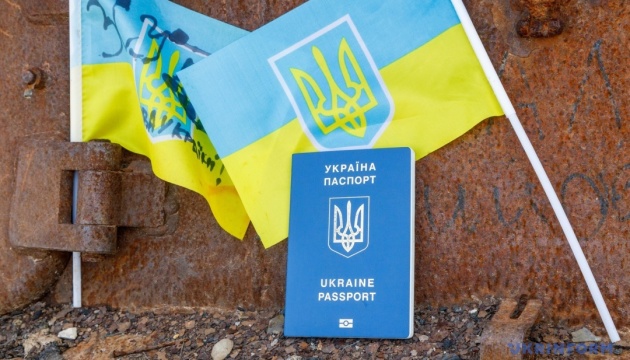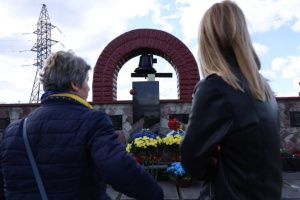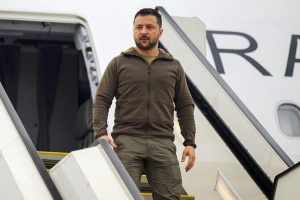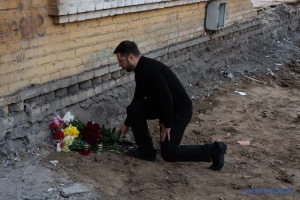
Over 90% of Ukrainians are proud of their citizenship
This was announced at a press conference in Ukrinform during the presentation of the results of a sociological survey by Mykhailo Mishchenko, Deputy Director of the Razumkov Centre's sociological service.
"According to the latest survey, 91% of respondents said they were very or rather proud of Ukrainian citizenship. In 2015, the number was less - 68%, and even less in 2010 and 2000 - 62% each. 95% of residents of the western region, 93% of residents of the central region, 92% of residents of the southern region and 83% of residents of the eastern region are proud of Ukrainian citizenship," - Mr Mishchenko said.
He noted that the share of those who are proud of Ukraine's national symbols is high. Thus, 64.1% of respondents said they were proud of the State Flag of Ukraine, 63.5% - of the State Emblem of Ukraine, 60.9% - of the State Anthem of Ukraine. At the same time, 31.7% have a positive attitude to the flag of Ukraine, 33% to the coat of arms, and 29.5% to the national anthem.
"Also, 65% of Ukrainians are proud of the state language, and 51% are proud of the Ukrainian currency. These figures are significantly higher than they were before the start of full-scale aggression, although slightly lower than in 2023," Mishchenko said.
According to the survey, almost 53% of respondents associate (identify) themselves with Ukraine. In 2006, the number was 31%, in 2013 - 44.5%.
28% of respondents associate themselves with the locality where they live, 13% - with the region, 0.1% of respondents said they still associate themselves with Russia, 1.6% - with the Soviet Union, and 2.6% - with the European Union.
According to the survey, in 2024, 94.7% of respondents identify themselves as Ukrainians by nationality or ethnicity. In 2000, the number was 72%. In 2021 - 87.3%.
In 2024, 61% of respondents believe that democracy is the most desirable state system for Ukraine. 14.8% said that under certain circumstances, an authoritarian regime would be preferable to a democratic one. For 12%, the state system does not matter.
50.5% believe that democracy in Ukraine is more important than strict order, while 21.2% of respondents have the opposite opinion. 28% of respondents said they found it difficult to decide on this issue.
The survey also asked respondents whether they are willing to endure certain material difficulties for the sake of personal freedom and guarantees of civil rights or whether they are willing to sacrifice the latter for the sake of their own well-being.
Thus, 24% of respondents said that in exchange for their own well-being, they were ready to give up some of their rights and civil liberties to the state. On the other hand, 47% are not ready to do so, 29% have not decided on the answer.
75% of respondents consider themselves to belong to the Ukrainian cultural tradition, 14.4% - to the pan-European one. In addition, 54% said that in 20-25 years, the Ukrainian tradition will dominate in Ukraine, 19% believe that the pan-European tradition will prevail, and 15.6% believe that different cultural traditions will prevail in different regions.
69.5% of respondents said they were fluent in Ukrainian, 27% said their level was sufficient to communicate at the household level, and only 2.2% said they did not understand Ukrainian well.
At the same time, 78% of respondents named Ukrainian as their native language, 13% said both Ukrainian and Russian were their native languages, and 6% said Russian was their native language. Compared to previous surveys, in 2013, 48% of respondents said Ukrainian was their native language, 26% said Russian, and 23% said both languages.
At home, 70% of respondents speak Ukrainian, 17% speak both Ukrainian and Russian, and 11% speak Russian.
71.6% speak Ukrainian outside the home, 20% speak both languages, and 7.6% speak Russian.
For 78% of respondents, Russia is associated with regression and backwardness, while 17.7% found it difficult to answer this question.
The survey was conducted by the Razumkov Centre as part of the USAID/ENGAGE activity, which is funded by the United States Agency for International Development (USAID) and implemented by Pact in Ukraine from 6 to 12 June 2024. 2016 respondents aged 18 and older were interviewed in all regions of Ukraine, except for the territories where military operations are underway and the temporarily occupied territories.




